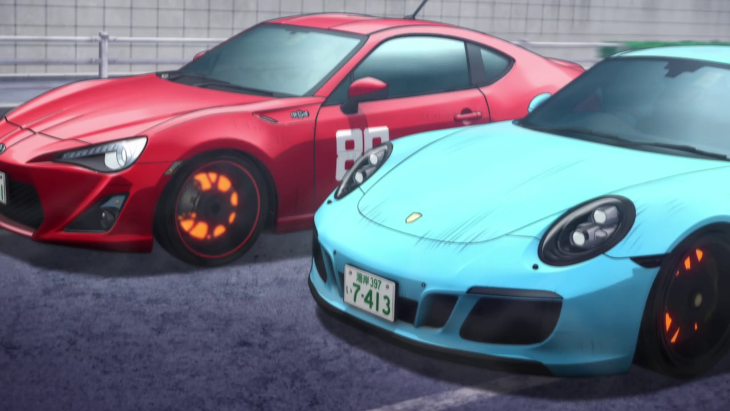
“Hey, Kanata. What can I do for you? Is it okay if I stay with you forever? I can’t deny what I’m feeling. Kanata… I love you.”
When I started to plan for the end of the Fall Season, I knew that certain shows would be continuing onward. Frieren was obvious, and Kusuriya no Hitorigoto was a pretty safe bet too. However, I was confident, almost certain, that there was no way that MF Ghost would only be a single cour. The show has been glacially paced. If you’re going to devote a full 5 episodes to a single race, there’s no way the show would slam on the brakes after only 12 episodes, right? However, this outlook makes the assumption that MF Ghost would do something competent. I’m not about to claim I disliked my time with the series, but I’ve found much of the production and many narrative choices involved to be thoroughly bewildering. So here we have a show whose plot moves at a crawl, whose characters have all the chemistry and appeal of warm milk, and is choosing to end this run after only a single season. Honestly, it’s amazing that this show is only mediocre when you consider how many problems it has working against it. MF Ghost is one of those bizarre failures of media that never comes together into something legitimately engaging, but through a perplexing Venn-diagram of issues, succeeds in not completely crashing and burning either. I can’t recommend it on its own merits, but as a lesson in storytelling, I think there are a multitude of interesting lessons which can be drawn from it.
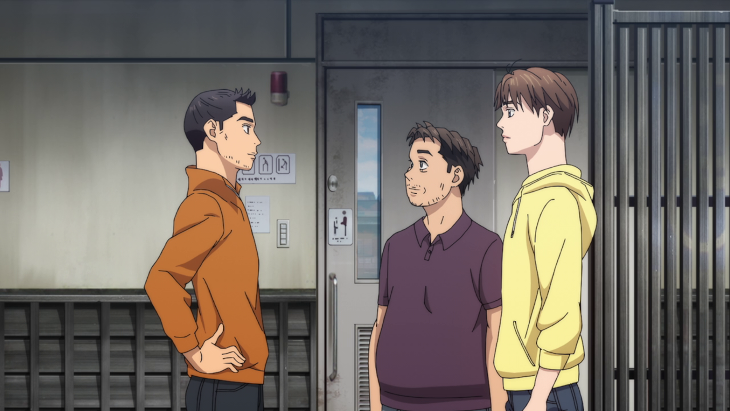
MF Ghost follows the young English-Japanese racer, Kanata, as he engages in an official series of high speed street races in Japan called MFG. His true goal is to locate his father following the passing of his mother, but as the former student of Initial D’s protagonist, his entry into the world of MFG grabs the attention of interested parties. At a glance, the components present should be capable of formulating decent drama, but MF Ghost doesn’t do subtlety. Whenever the show takes opportunities to spend time with its characters, things become overwrought quickly. This is most notable with the “romance” between Kanata and Ren, the daughter of the family he is staying with. I have legitimately compared their romantic interactions to scenes from The Room, and while I’ve obviously chosen an extreme example for that comparison, it is still reflective of the stilted, uncomfortable and cloying atmosphere surrounding the subplot. This emphasis on courtship doesn’t do Ren any favors, since it defines the bulk of her character, and she’s not alone in that. I don’t like citing the Bechdel Test, due to its gag origins and the fact that it isn’t always narratively applicable, but it’s amazing how significantly Kanata occupies the minds of the female cast. It also doesn’t help that age is a regular factor in the show’s relationships, as Ren is currently 17 and one of the racers is a 25 year old who’s actively interested in dating her. The only element that salvages that character is that he isn’t aware of her age, and point blank stated he has no interest in dating high schoolers. Unfortunately, this was brought up in a conversation with another driver who only dates 17 year olds. When reflecting on the season, it becomes easy to harp on the romance, as it’s one of the few subplots regularly revisited throughout the show. Most of the other underlying dramatic elements are largely sidelined for episodes at a time, as the show doesn’t split its attention much during racing, and Kanata doesn’t spend time thinking about other matters. However, since Ren is a grid girl for MFG, the show regularly cuts away from the action to focus on her responses, and her inner turmoil about how ‘obviously hot and not at all easy to mistake for a background character’ Kanata is. This focus on presenting the races in a more real-time and focused manner could work to the show’s advantage, but it doesn’t succeed in nailing the balance needed.
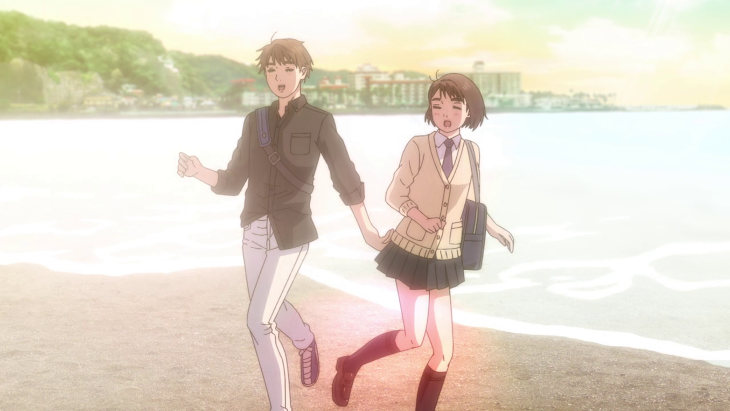
If we were to cleanly divide the show between the drama and racing sections, it would be fair to say the racing is the superior portion. While I’ve never watched or read any of his previous works, I get the sense that Shuichi Shigeno works better at conveying technical action than interpersonal theatrics. The racing sections focus on the competition as a whole, jumping between numerous characters and examining their outlooks on the race and their strategies or lack thereof. The problem with the anime’s approach is ultimately two-fold, but first let’s compare it to a show with a similar strategy regarding its presentation. Big Windup! regularly spent large portions of its runtime on its games and took a methodical and strategic approach to its presentation. However, it mainly focused on the internal analysis of its leads, and to a lesser extent the opposing team. MF Ghost spends most of its race time focusing on drivers other than Kanata, most of whom aren’t even interacting with him directly. Even the secondary cast who are simply observing the race will often get more opportunities to reflect on the goings-on than Kanata, which is a strange balance. The intent is likely to make him a calm, quiet operator, but it ends up harming the viewer’s ability to connect with him. Plus, this approach comes with the added irony that we spend much of our time on racing duels between competitors whom we’re, at best, barely familiar with. If there is one thing MF Ghost does well, it’s the actual showdowns during races, as the show is effective at building up the tension. I just wish the show’s strengths could break free from its pack of seemingly incompetent missteps.
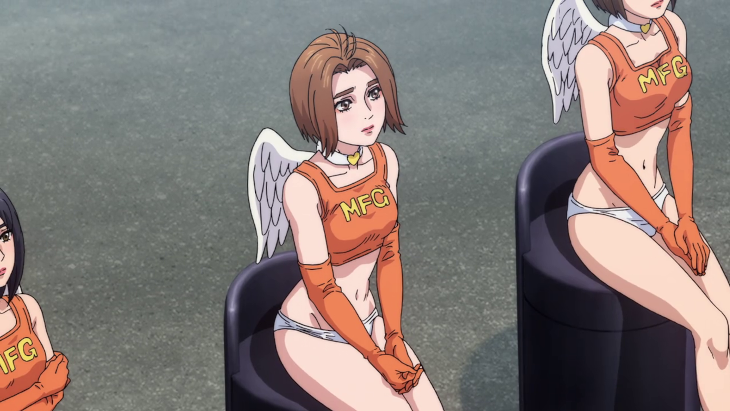
I was a bit kind to the premiere when discussing its visuals, but while I have some complaints about the show’s appearance, it seems that much of that comes down to Shuichi Shigeno’s questionable aesthetics, rather than an issue with Felix Film’s handling of the material. A big issue is the ostensibly large amount of fanservice and the emphasis on characters’ physical attractiveness. To start off, I called it an “ostensibly” large amount of fanservice, because this show has some of the most tepid attempts at pandering to the male gaze I’ve ever seen. So much time is spent focusing on the grid girls, the MF Angels, and yet, it is clear the designer of those characters and costumes didn’t understand how to draw characters or outfits to look appealing. I don’t even like fanservice, but there’s something incredibly frustrating about a show that is aiming to be lurid, but failing to a frustrating extent. A similar issue comes about with our two romantic leads. Characters will not shut up about how attractive Kanata is, but that’s never reflected in his design. He looks like a background character in a Persona game. We’re consistently told both he and Ren are gorgeous, but this is where the philosophy of, “show, don’t tell,” falls firmly on its face. If you’re incapable of visually expressing something with your art, then you’re left with no choice but to tell the audience constantly and hope they’re suggestible. The music is decent. Techno-Eurobeat is both intrinsically tied to the Initial D property, and a music genre that I have no firm attachment to. It highlights the action well, and it can get the adrenaline pumping during the more active parts of the races, but it isn’t an element that will stick with me. However, for fans of the genre or of Initial D, I can affirm that the show uses its soundtrack effectively.
Before I wrap up, a few Notes and Nitpicks:
- For reference, the moment that made me go, “This is like watching romantic exchanges from The Room,” was when Kanata and Ren are hanging out, building up their romantic connection, and start to playfully throw sand at each other. That’s how flirting works. Snow, I can understand. Water, I can understand. Hell, they’re on a beach; there’s water available. But sand? Everything up to that point was already cloying, but that was the moment that made me ask myself what I was watching.
- I understand I’m harping on the 17 thing, and the age of consent differs in Japan. However, it bugs me, the show regularly draws attention to it, and I’m writing my reviews for a Western audience.
- The show has been confirmed for a second season, which is good since the last episode ground to a screeching halt. It’s better than what Birdie Wing turned in as its first season closer, but like with that show, I doubt I’ll be tuning in for more. There’s still a chance, but MF Ghost would need some light competition to get me to return for another go.
- While I’m on the subject, the finale reveals that Kanata has an eidetic memory which he seeks to hide from others, seemingly due to how it is stigmatized. This left me… baffled. What fantasy future are we in, where an eidetic memory is something you go out of your way to hide from everybody, including family friends whom you’re living with!? This doesn’t even make sense from the perspective of trying to surprise the viewer, because we already know that Kanata has an exceptional memory. The last episode literally spends a couple minutes on this. You see what I mean when I call the show strangely inept?
- In the first episode, Ren laments how ridiculous the concept of love at first sight is, and how physical appearance doesn’t define who you are. Then she sees Kanata, and that’s the last thought she has that doesn’t involve him.
- What does MFG even stand for?
MF Ghost is an odd show. It isn’t bad, but the overwhelming majority of its components lack basic competence. The writing is heavy handed, but tries to hide information from the viewer for no reason. The romance is head scratching in how poorly it is implemented. Even the racing falls prey to odd choices. The fact that this show isn’t bad is frankly shocking, but what it does right, it does consistently enough to avoid being a slog. Still, I can’t recommend this. There are better anime this season, and there’s even a better racing anime from this season.

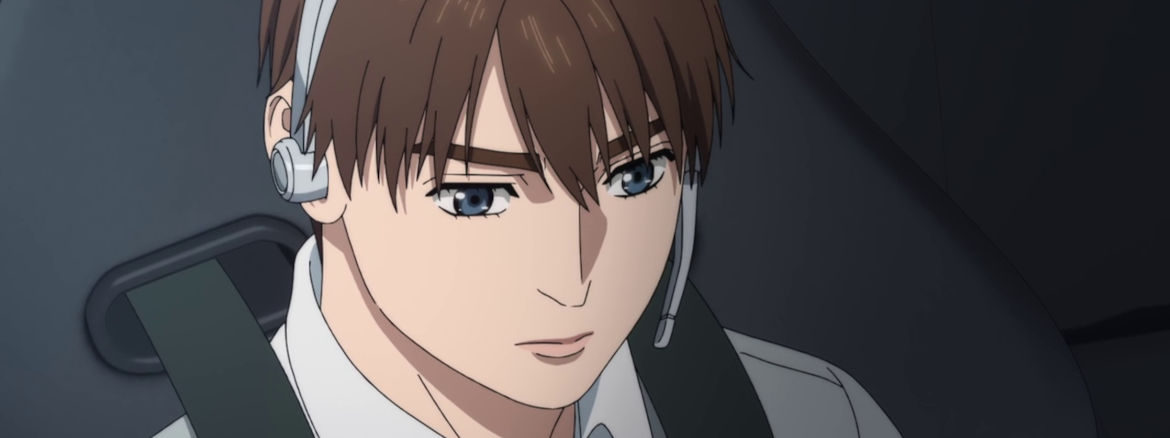



Add comment